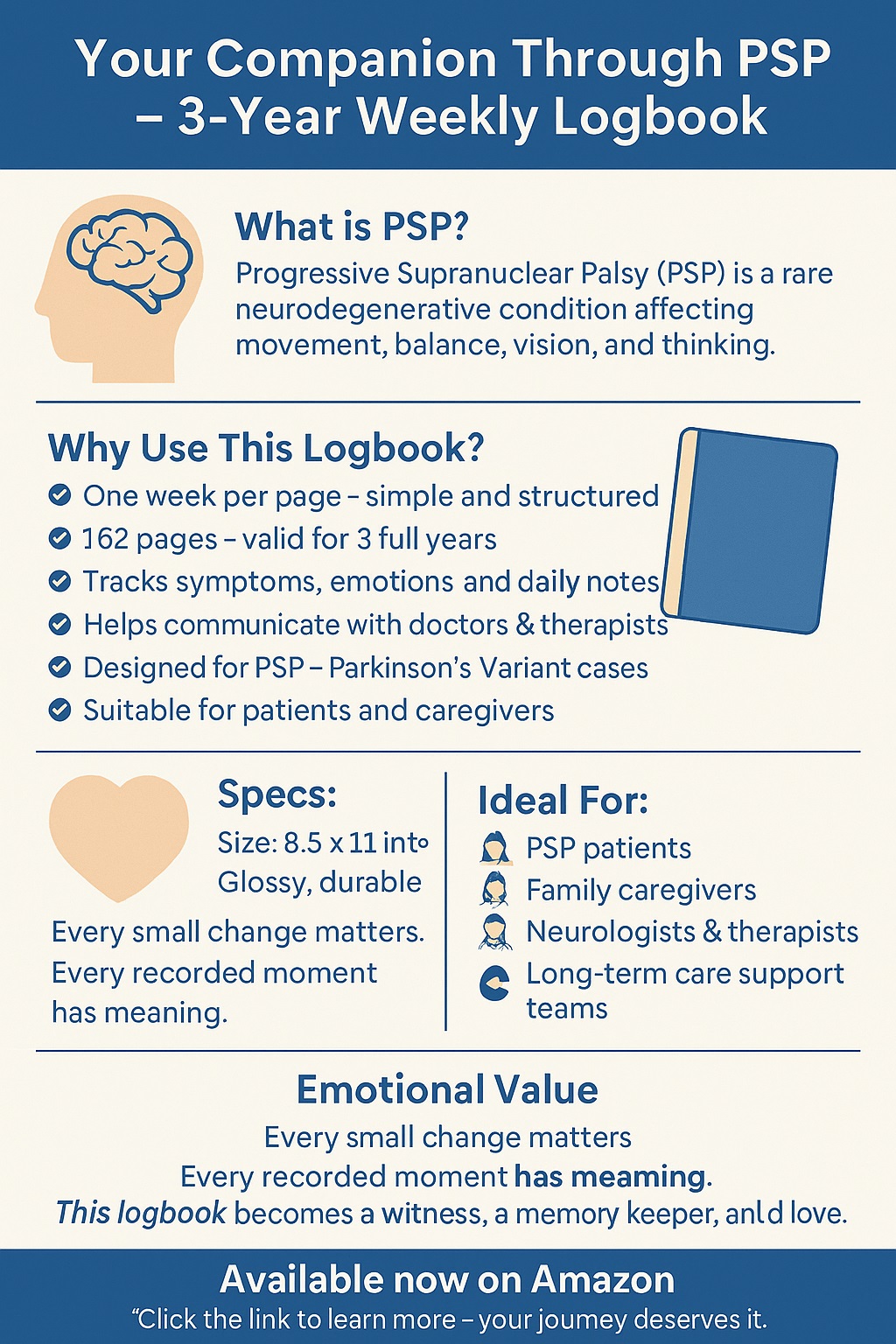Progressive Supranuclear Palsy (PSP) is a rare, relentless neurodegenerative condition that slowly steals the body’s ability to move, speak, and even swallow. For those diagnosed—and for the brave souls who care for them—each day becomes a delicate dance between uncertainty and courage. And in that fragile space, clarity, consistency, and documentation can be life-changing.
That’s where a long-term logbook becomes more than just pages—it becomes a companion, a witness to the journey, and a vital tool for communication and care.
Why Keeping a Logbook Matters in PSP
In diseases like PSP, where symptoms can shift subtly but significantly over weeks or months, tracking changes is not optional—it’s essential. Doctors rely on accurate history to adjust medications, therapists observe patterns to refine rehabilitation, and caregivers need evidence to advocate effectively.
But more than that, a logbook gives a voice to the silences—the tiny declines that might otherwise go unnoticed, the brief moments of progress that would be forgotten, and the emotional shifts that are hard to put into words.
This is especially true in PSP – Parkinson’s Variant, where symptoms often mimic classic Parkinson’s Disease but require different responses.
A Logbook That Understands the Journey
The Weekly Progressive Supranuclear Palsy PSP Logbook was created out of necessity—with care, precision, and dignity at its core. It’s not just a notebook. It’s a structured tool designed for three years of consistent tracking, with one week per page across 162 pages.
-
Weekly Format: Gives space to reflect on small but meaningful changes without being overwhelmed by daily entries.
-
Designed for Memory and Motor Challenges: The clean layout helps caregivers or patients note observations without stress.
-
8.5 x 11 inches: Large enough to write comfortably, even for those with fine motor issues.
-
Glossy cover: Durable, wipeable, and dignified—because documentation deserves to feel professional and beautiful, too.
3 Years of Strength, One Week at a Time
Three years may feel both hopeful and heavy in the context of PSP. But a logbook designed to last that long means more than convenience—it symbolizes a commitment to care through all seasons of the illness.
For the Patient:
-
A sense of agency over a disease that often robs them of control.
-
A way to record and share experiences, even when speech becomes difficult.
-
An emotional space to reflect on good days, frustrations, and small victories.
For the Caregiver:
-
A clear view of how the disease is evolving, week by week.
-
A record to share with doctors, neurologists, or therapists.
-
A personal tool for emotional processing—because caregiving is as much a journey as the disease itself.
For Medical Professionals:
-
Reliable data across long periods helps make informed, patient-specific decisions.
-
It supports early detection of complications or behavioral shifts.
When Words Are Hard to Find, Pages Speak
One of the cruel aspects of PSP is the erosion of communication. As speech fades and motor functions falter, it becomes harder for patients to describe pain, emotions, or fears. That’s when a simple line in a logbook can serve as a lighthouse for understanding.
A note that says “more coughing after meals”, or “seemed distant today”, could help prevent pneumonia or track cognitive decline. It might look small on the page—but it could mean everything in practice.
Dignity in the Details
Having a beautiful, organized logbook—rather than loose sheets or digital notes—reinforces the humanity and dignity of the person living with PSP. It says: Your journey matters enough to be recorded. Your life deserves order and attention. You are not invisible.
In the chaos that often accompanies progressive neurological disease, something as simple as turning to the next page and seeing a fresh week waiting can feel grounding. It gives rhythm. It gives time meaning.
PSP May Be Rare, But You Are Not Alone
For families dealing with Progressive Supranuclear Palsy, isolation is common. The disease is not widely understood. Treatments are limited. Support is often local and sparse.
But a tool like this logbook connects caregivers and patients to a broader movement: a community of people who are documenting, understanding, and honoring the complexity of PSP.
It’s a quiet resistance to forgetting. A reminder that even in fading speech and failing muscles, there is still a life full of presence, love, and meaning.
A Companion, Not Just a Record
The Weekly Progressive Supranuclear Palsy PSP Logbook is more than paper. It is a caregiver’s companion, a patient’s mirror, and a family’s memory keeper. It holds the weight of sorrow, yes—but also the light of resilience.
Because what is documented can be understood. And what is understood can be met with grace.
For those walking this path: you don’t have to do it blind.
Your steps matter. Your story matters.
Let the pages walk beside you.
(Click to see more about the logbook—discreet, helpful, and built with heart.)
About Me
Perumira Global Talent Magazine is an international publication celebrating beauty, art, and empowerment through exclusive interviews with top models, beauty queens, and creative professionals from around the world. For over 11 years, Perumira has been a stage where talent meets inspiration — sharing authentic stories, achievements, and experiences that redefine success and elegance.
Founded with a passion for storytelling and cultural diversity, Perumira connects readers across continents, showcasing rising stars and established icons who lead with creativity, intelligence, and heart. From the glamour of global pageants and fashion runways to the voices of empowered women transforming industries, the magazine highlights authenticity, resilience, and purpose.
More than a magazine, Perumira is a global movement that promotes visibility, confidence, and innovation in every form of talent. With a growing English and Spanish audience, Perumira continues to inspire new generations to believe in their dreams, embrace their identity, and shine on their own stage — because every story deserves to be seen and celebrated.



























